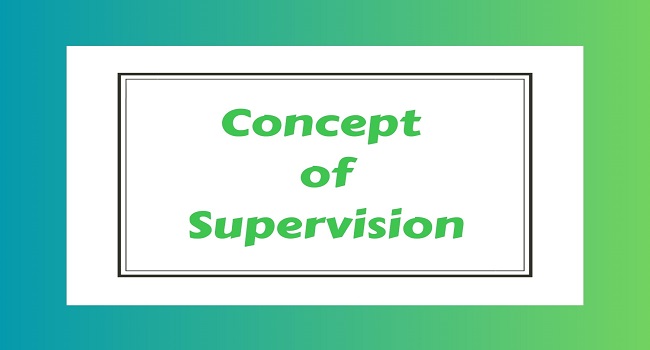Table of Contents
Concept of Supervision:
Supervision is one of the most important tasks of management. No organization, whether public or private, can work without the provision of supervision at the different levels of administration. Supervision is an important factor in the coordination process of any organization. It is also an important factor in the emergence of a desired team spirit of human relations, teamwork, motivation, morale, and quality of work of the personnel. It is usually said that the quality of work depends upon the quality of supervision. It is through effective supervision that the desired and needed control can be exercised over the personnel working in the organization.
As Henry Fayol points out, to prepare the operations is to plan and organize, to see that they are carried out is to command and coordinate, and to match the results is to control. Supervision is one of the most major tools of control in every organization. Such control is inherent in the hierarchical structure of an organization. Supervision characterizes all levels of the hierarchy of offices/units. Each higher level supervises the work of its immediate lower level. Supervision is the control as well as link mechanism in every organization.
Pfiffner also points out, “From one point of view, supervision runs up the hierarchy to its highest levels- bureau chiefs supervise division heads, who in turn supervise section heads and who supervise the rank and file.” In every organization, supervision is found at all levels and this top-to-bottom chain relationship provides coherence to the organization. According to Millet, “Supervision entails two purposes:
- To achieve coordination among the component parts of an agency.
- To enable the units of an agency to accomplish the assigned tasks.”
Supervision Meaning:
The word Supervision is a combination of two words ‘super’ and ‘vision’ which means to oversee or superintend or a superior vision or the power of perceiving. As such, the literal meaning of supervision is to oversee or superintend the working of employees in an organization.
In simple words, supervision implies the superior’s power of supervising the work of others. It is an act of overseeing and guiding the activities of the subordinates by their superiors. Supervision can be defined negatively as well as positively.
Negatively, Supervision means directing, investigating, and supervising the activities of personnel in the organization.
Positively, Supervision means guiding and advising the subordinates engaged with the objective of achieving the required targets.
Both the negative and positive connotations can be combined to conceptualize supervision. That is why the meaning of Supervision varies and does not always convey an identical meaning to all persons.
Supervision Definition:
Supervision has been defined differently by different writers. Some of the more popular definitions of Supervision are as under:
(1) Terry and Franklin, “Supervision means guiding and directing efforts of employees and other resources to accomplish stated work outputs.”
(2) Williamson stresses the humanistic nature of supervision and he defines Supervision as a “process by which workers are helped by a designated staff member to learn according to their needs, to make the best use of their knowledge and skills and to improve their abilities so that they may do their jobs more effectively and with increasing satisfaction to themselves and the agency.”
Supervision is a two-way process. On the one side, it is a guiding process, while on the other side, it is a process of superintending the work of others.
(3) According to Henry Reising, “Supervision is the direction, accompanied by authority, of work over others.”
(4) According to Halsey, “Supervision is selecting the right person for each job, arousing in each person an interest in his work and teaching him how to do, measuring and rating performance to be sure that teaching has been fully effective, administering correction where this is found necessary and transferring to more suitable work, dismissing those for whom this proves ineffective, commending whenever praise is merited and rewarding for good work, and finally fitting each person harmoniously into the working group- all done fairly, patiently and tactfully so that each person is caused to work skilfully, accurately, intelligently, enthusiastically and completely.”
Thus supervision is the process of directing and controlling the work of the subordinates by the superior.
Different Aspects of Supervision:
Supervision is a broad term and its nature and scope varies with the kind of work, the people to be supervised, the extent of supervisory responsibility, and the level of supervision of the supervisors.
Supervision is affected by a supervisor through the performance of several functions. A supervisor performs several different kinds of functions. His job may thus be described as:
- Substantive or technical function relating to the work to be done.
- Institutional or objective relating to the policies and procedures according to which the work must be done, and
- personal, relating to the handling of workers.
Thus there are three principal aspects of the Supervisor’s Work:
(1) Substantive or Technical Aspect: A supervisor is to have adequate knowledge and skill of the work. He must know the techniques and the know-how of his work because he has to plan his work, assign duties to others, set standards of performance and get work from others.
(2) Institutional Aspect- A supervisor has to run the agency as a unit under his charge according to the established rules and procedures and within the framework of policies. He should ensure that work is rightly done and accomplished on time. He is responsible for the assignment of duties and for regularity in attendance. He is also responsible for the proper conservation of equipment and supplies.
(3) Personal Aspect- In order to get the work done in an effective, efficient, and orderly manner, the supervisor has to create interest and enthusiasm among the workers in the work. He has to show initiative, expertise, and leadership qualities. He has to exercise his authority without facing a reaction. Authority flows from within. In order to let authority arise from within the organization, a supervisor must be human, sympathetic, and considerate in nature. He must possess the art of cultivating, maintaining, nurturing, and fostering human relations.









Comments (No)